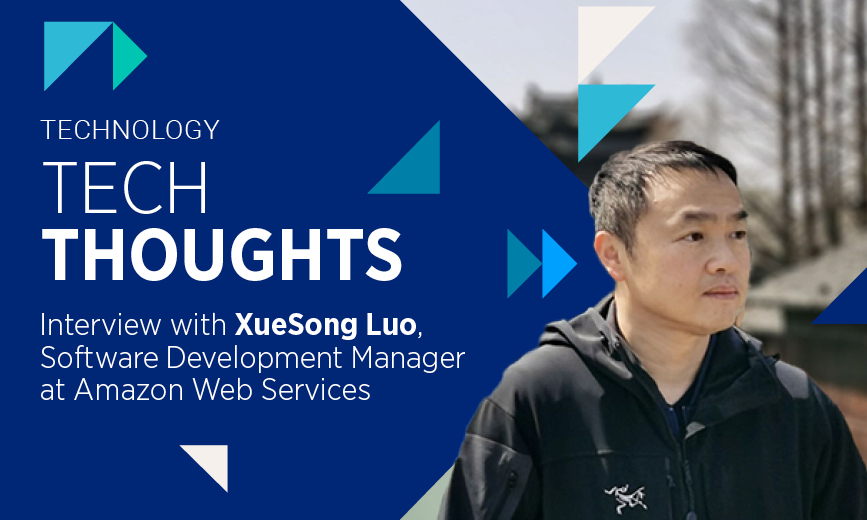Tech Thoughts: Interview with Xuesong Luo, Software Development Manager at Amazon Web Services

Show (MyWorld) is Hays’s first interactive quiz that gives technology professionals and organisations a platform to share their personal views on technology industry related topics. From the growing need for work-life balance, to compensation, and even the importance of company culture, Show (MyWorld) sheds light on real sentiments of the technology
community of today.
community of today.
In this first edition of Tech Thoughts, we had a chat with technology professional, Xuesong Luo, Software Development Manager at Amazon Web Services and asked him to share his experiences and learnings as a seasoned professional in the technology industry.
1) How did you start out in the technology industry and what led you to your current role?
After getting my master’s degree in the US, I started my career there as a C/C++ Developer in the mobile billing industry, before switching to a Java Engineer building SAAS applications. The most memorable part of my career journey was when I joined a Silicon Valley start-up, Successfactors in 2006. As one of the first 30 engineers in the company, I worked around the clock with a group of talented engineers that led the business to become one of the top 3 HCM solutions in the world, before going public in 2007, acquiring noteworthy customers like Siemens/Bosch.
In 2009, the Successfactors CEO decided to open an R&D centre in Shanghai to which I was tasked to setup the team and relocate to Shanghai. When Successfactors was acquired by SAP in 2012, it was rewarding for me to see how my small team of engineers had grown to over 30 technology professionals in such a short time.
In 2016, I joined a Future 500 company, Thermofisher, as the Head of their Cloud Engineering team. In 4 years, I grew the team to over 20 engineers and built multiple mobile/web applications to aid digital transformation for this once-traditional company.
In late 2019, I took on the role as Senior Engineer Manager in Ebay/StubHub, but only a few months in, StubHub was sold by Ebay to Viagogo. These dramatic changes presented the most significant assignment in my career; to migrate the StubHub platform from the Ebay Datacenter to Google Cloud and split the platform to North America and internationally. In the next 1.5 years, I led over 100 global engineers to migrate thousands of VMs and hundreds of services to cloud. This wasn’t your typical lift and shift. It also included service decoupling, modernisation and data separation. StubHub’s president Jill Krimmel described it as the most challenging project in StubHub history, having nobody believe that we could complete the project on time, but we overcame all challenges and made a miracle.
A few months ago, I joined Amazon Web Services to ramp up a new engineering team of technology professionals in their Shanghai AI lab. I found this to be a very exciting opportunity as I got to work with top talents to build a world-class open source search platform (AWS open search), and that’s where I am now!
2) That’s quite a track record! What made you decide to pursue a career in the technology industry as a software engineer?
I took a liking to programming since graduating from college, and I personally believe that software will play an increasingly important role moving forward. Software can make the processes of every industry more efficient and predictable.
3) How has such multi-region technology career and life experiences, both overseas and in Asia, been beneficial? Looking back, what advice would you share with your younger self?
3) How has such multi-region technology career and life experiences, both overseas and in Asia, been beneficial? Looking back, what advice would you share with your younger self?
Having an overseas working experience in the technology industry has taught me how to better collaborate with people from different backgrounds and personalities. Not to mention getting a feel of the big difference between working for a big traditional company vs a fast growing Internet startup. Upon returning to China, my overseas experience made working with global teams much easier.
If I had the chance to restart my technology career again, I would like to attend college in the US and start my career with a technology leader like Amazon before moving on to a Silicon Valley startup to pursue my dreams.
4) How would you say the technology industry has evolved since you started working in the field?
Cloud is the biggest difference. It changed not only how we design software, but how we run operations.
5) How did you match up in our Show (MyWorld) quiz?
I matched pretty well, all 60% and above!
6) With the statistics shared from the Show (MyWorld) quiz from other technology professionals like yourself, tell us what would be the 3 most important things you look for when considering a job role?
Responsibility, industry and company as well as compensation.
Interestingly, the 2022 Hays Greater China Salary Guide Technology Industry Supplement showed that the most important factors that influenced career choices were career development, salary and benefits. When it came to evaluating their next steps when pursuing a career, 39% of technology professionals expressed the need for career development and progress opportunities, while 33% prioritised salary and benefits.
7) What’s your view on continuous learning & self-upskilling?
Continuous learning is critical, especially for software engineers and technology professionals in the Internet industry, because the tech world evolves much faster than any other industry .
8) What sources of information do you usually leverage upon for upskilling or reskilling?
I enjoy reading tech articles on WeChat when I have some free time. But if I need to get a deeper understanding of new tech knowledge, I prefer to read official documents or even e-books by technology leaders. I also used to learn from online platforms like Coursera, etc.
Just like Xuesong, the 2022 Hays Learning Mindset Report shows us that 65% of workers in China’s technology industry find continuous learning to be ‘Extremely Important’. 70% of working professionals in China acknowledged that their respective employers make learning resources available, in comparison to the global average of just 52%.
9) What’s your view on quiet quitting (躺平) among young technology professionals and the 996 work culture in China’s technology industry?
I don’t support either. I have seen many success stories from my ex-co-workers and friends, all of whom put in the hours to achieve what they have today. ‘996’ shouldn’t be accepted as a company’s culture, in my opinion. I have had the experience of working more than 12 hours a day for a few months on end, but I understood how critical it was at the time for the company to meet the deadline. Personally, I believe that ‘996’ is not sustainable in the long run. The tradeoff is the employee’s health and family relationships.
While pulling in overtime hours may come as no surprise amongst technology professionals, the 2022 Hays Greater China Salary Guide Technology Industry Supplement found that only 15% of professionals work less than 40 hours per week. This finding aligned with recent LinkedIn and WeChat polls conducted by Hays to discover the sentiments Asia's working professionals on quiet quitting, where 50% agreed that they felt motivated to exceed expectations at their workplace.
The report also advises employers to better understand and recognise the needs and preferences of working professionals when it comes to areas that encourage personal development, such as work-life balance and flexible working hours. While most technology professionals are satisfied with the current policies of their existing companies, employers are urged to keep these factors in mind to attract the right candidates and increase staff retention in the long run for overall business success.
10) Outside of work, what activities energize you?
I’m a huge sports fan! I used to play soccer almost every week since middle school until a few years ago when I decided to switch to ‘lighter’ exercises like swimming. I also enjoy travelling when I get the chance to. My favourite travel destinations are Yunnan, Sichuan and Hangzhou – locations that are abundant with beautiful scenery and delicious food. Playing sports and travelling are my go-to outlets when I need to relax and reenergize, especially under the pressure of a highly demanding industry.
11) How do you maintain a healthy work-life balance, especially in such a competitive industry? Please share with us some of your life hacks.
Work-life balance in the technology industry to me is not about the hours spent ON work, but finding the flexibility to choose WHEN to work. For example, I may choose to leave the office early in the afternoon once or twice a week to exercise or tend to my family (if I’m freed up from meetings or have no urgent tasks due that day). However, I always make it a point to spend a few extra hours working in the evenings or over the weekend. While it usually surpasses far beyond the make-up hours needed, this algorithm helps me create a better balance. At the end of the day, I know that I enjoy what I do with a mindset of always wanting to do better.
12) There are stereotypes relating to programmers that we'd love to debunk. What could be some unexpected admirable traits in dating one?
Not much tips I can provide here, unfortunately! But what I CAN tell you is that programmers are typically not good at showing their brilliant side. It takes time, a little faith and some patience to unravel it. But once you do, it’ll be worth it!
Find out how your views match up with others in your field through the Show (MyWorld) quiz
Download the 2022 Hays Greater China Salary Guide Technology Industry Supplement here.

Hays Asia Salary Guide
The latest info about salaries, hiring trends, and workplace priorities for China and across Asia.

Are you ready for the Future of Work?
Get the answers you need to shape a workforce ready for tomorrow’s technology challenges.
Navigate the future

2025 Talent Trends
Understand the underlying economic and industrial shifts that are defining China’s evolving workforce.

Looking for a job?
Connect with our recruitment consultants and match up with suitable job opportunities in China.
